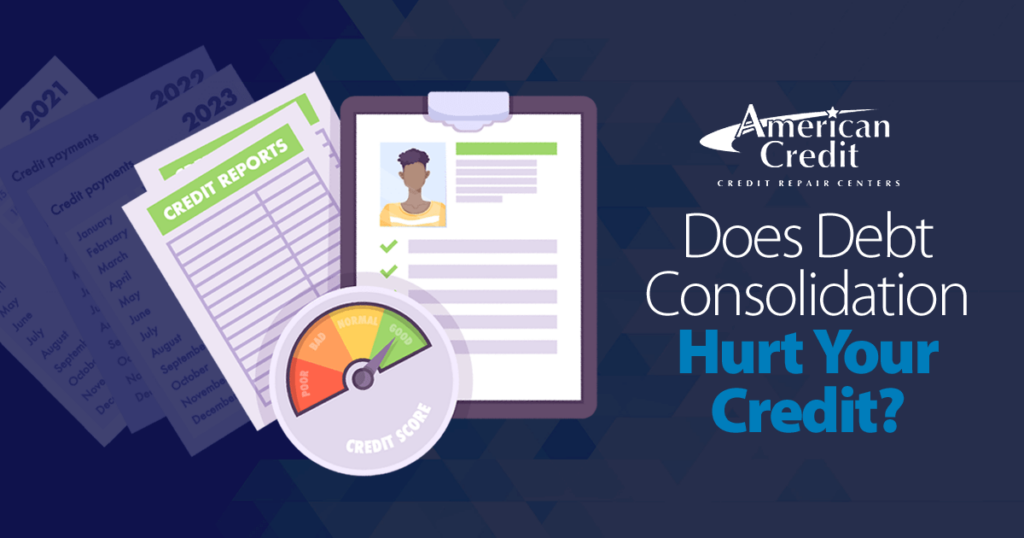
Debt consolidation can have long-term benefits if you stick to your plan. It can improve your situation, but there’s also the possibility consolidation can lower your credit score. To answer the question, “Does debt consolidation hurt your credit?”, we’ll look at the reason borrowers choose this option and the different factors that apply.
Why Consider Debt Consolidation?
Some credit cards have interest rates exceeding 20%. By transferring and consolidating balances onto a new card or loan with a lower rate, you can save money over time. However, balance transfers often involve fees. Compare these against lower rates you find to determine if you’ll see significant savings. If so, debt consolidation can make things easier, especially if you have multiple accounts to remember to pay. After all, paying late or missing payments has the most negative impact on your credit score.
Negative Impacts of Debt Consolidation on Your Credit Score
Debt consolidation requires a loan or balance transfer credit card. You’re essentially taking on new debt to pay off old debt. In the short term, this has a negative impact due to:
- Hard Inquiries: Applying for a loan or balance transfer card to consolidate triggers a hard inquiry on your credit report. Hard inquiries drop your credit score a few points, but the effect is usually only short-term.
- Average Age of Credit: The new account also contributes to lower average age of all your credit accounts, causing a decrease in the average length of your credit history.
- New Credit: New credit is seen by lenders as an additional risk. Opening a new account typically has only a temporary negative effect. Paying your new account and others on time will help convince them you remain a creditworthy borrower.
Positive Impacts of Debt Consolidation
Debt consolidation can help build your credit over time. It can raise your credit score provided the following factors apply to your credit situation:
- Reduced Credit Utilization: A balance transfer card, if it has a high credit limit, can lower your credit utilization rate. Your utilization will decrease even more as you pay off that card. Lower usage on that card and your credit overall can boost your credit score.
- On-Time Payments: The FICO model weighs your payment history most heavily in calculating your credit scores. This makes your consolidated debt payments on time and will therefore have a positive impact on your credit score, which is another incentive to remember your due dates.
- Financial Management: Your financial situation can improve by consolidating your debt. Once you manage your new account and pay it down, you can better manage other debt payments, which will show lenders you’re less of a risk.
Whether you use a balance transfer card or personal loan, the state of your credit will determine your interest rate and the initial impact on your credit score. There are other options too. A home equity loan or home equity line of credit may be an option if you own a home. But it comes with high closing costs and uses your home equity as collateral; this means you could lose your property if you default on payments.
If you have poor credit, a debt management plan can help. A credit counseling agency can assist in negotiating lower monthly payments and interest rates with your creditors. However, this often requires closing credit card accounts, which negatively affects your credit history.
How to Benefit from Debt Consolidation
The right strategy can make debt consolidation a less stressful, more positive experience. Here’s how you can achieve long-term advantages:
- Add up all your debt, including interest rates, and compare your monthly payments to your budget to determine what you can afford to pay.
- Do your research and compare multiple offers; with great credit, you can possibly combine loans, balance transfer cards, and home equity to pay down debt.
- Don’t take on more debt as you’re paying down the balance; if you do, you may struggle to pay towards the plan and other cards you are using.
- Stick to your plan. Defaulting on payments can result in the plan being terminated. Also, pay down the balance before an introductory 0% APR period ends or you’ll be assessed interest at the issuer’s standard rate.
Raise Your Credit Score to Get the Best Interest Rate
At American Credit, we employ a pre-litigation process to get creditors to respond. The creditor must prove they have complied with all laws within a certain time, or a negative item on your credit report must be removed. This is far more effective than the dispute resolution process. Whether you’re wondering, “Does debt consolidation hurt my credit?” or planning on renting a home, applying for a mortgage, or looking for a job, we can help raise your credit score. Call (855) 213-4043 to learn more.

Recent Comments